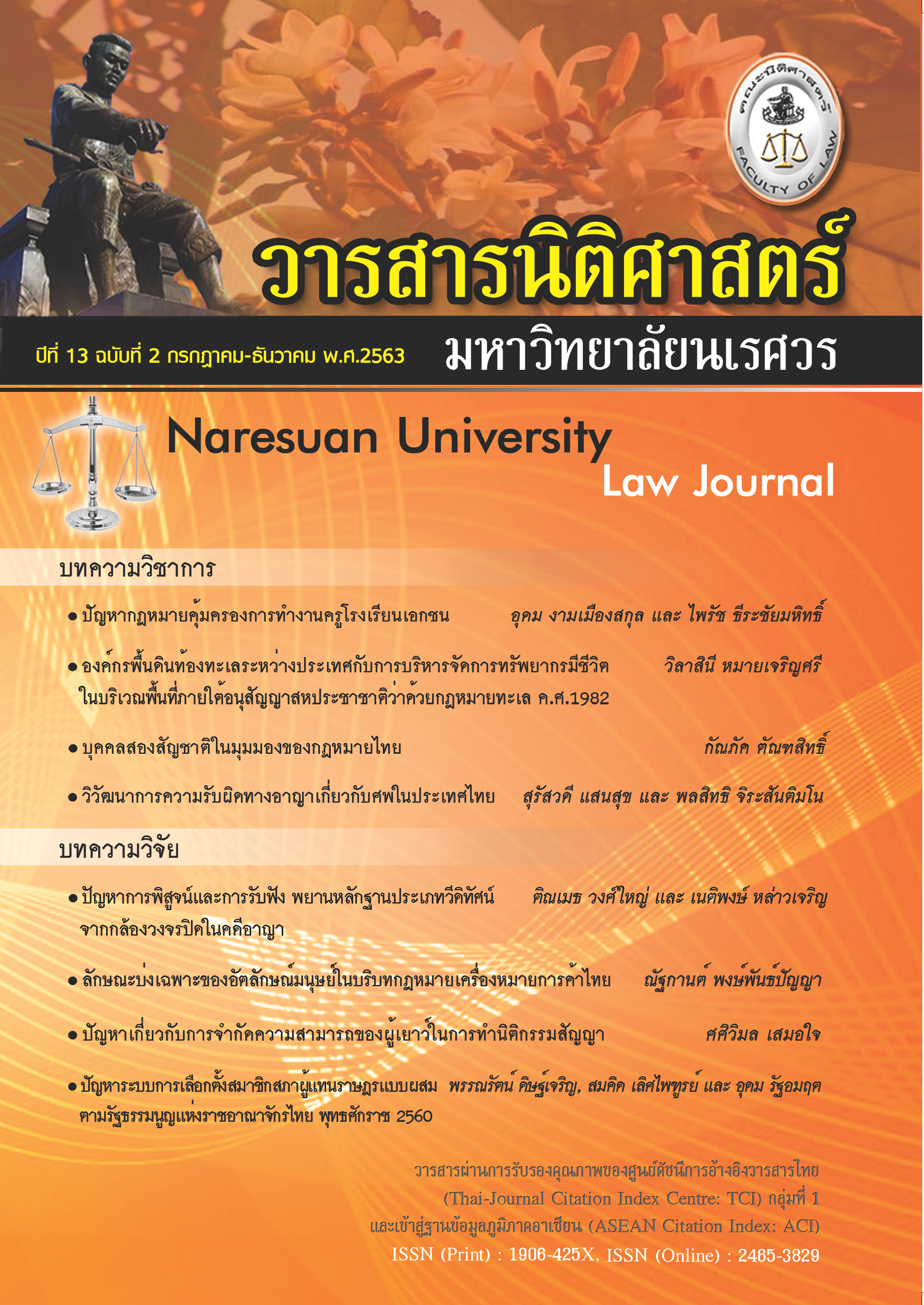The Problems of Verifiable and Admissible Evidence Derived from Closed Circuit Television Video Relating to Criminal Cases
Main Article Content
Abstract
In Contemporary society, the advancement of technology has an extremely developed; resulting in the video and audio recorders from the Closed-Circuit Television (CCTV). It can be implemented as the worth evidence as the abduction and the material evidence has officially used in the criminal proceedings. According to the Criminal Procedure Code, the laws relating to the abduction and the admissibility of material evidences in terms of the video and audio from the CCTV. However, the various issues dealing with the evidences have seriously been lacking of studies especially the status of the material evidences, the problem, and the obstacles of the abduction and the admissibility of the CCTV’s evidences in criminal matter. Because its reliability can be improved as well. So, the objective of this study is to suggest for more precise legal resolutions. There is a verifiable direction as well as a lacking such the criteria, the expertise and the institution that can be supported in the forensic science from CCTV. Overall, the basic information is to be suggesting the effectively legal improvements.
Article Details
References
CA Nancy. “ch.soc., 18 Janv. 2017, n 1500138/.” Accessed December 19, 2019. https://www.doctrine.fr/d/CA/Nancy/2017/C955455099E4F61ECCA2B?fbclid=IwAR1EOd_VTDqBm0vlTgm53p1XoX9oYLPNkW3QYJwp8P7bxs598dQKAzDOM.
Cour d’appel de Nancy. “Chambre Sociale, 18 janvier 2017, n 15/00138.” Accessed December 19, 2019. https://www.doctrine.fr/d/CA/Nancy/2017/C955455099E4F61ECCA2B?fbclid=IwAR1EOd_VTDqBm0vlTgm53p1XoX9oYLPNkW3QYJwp8P7bxs598dQKAzDOM
Cour de Cassation. “Civile, Chambre Sociale, 17 Juin 2009, 07-44.29.” Accessed December 21, 2019. https://www.legifrance.gouv.fr/affichJuriJudi.do?idTexte=JURITEXT000020773236.
IDRLab. “Data Logging Devices that are Currently Used.” Accessed December 22, 2019. https://www.idrlab.com/content/12614/. [In Thai]
Jaran Pukditanakul. Law of Evidence. 14th ed. Bangkok: The Thai Bar Under The Royal Patronage, 2019. [In Thai]
Praphat Nuannet. Teaching Documentation CB 301, Radio and Television Program Production. Broadcasting and Television Program. Bangkok: Faculty of Communication Arts University of the Thai Chamber of Commerce. [In Thai]
Prasit Kovilaikun. “Memo of the Criminal Procedure Code, Section 39 (4) and the Verdict Section 39 (4).” Law Journal 4, no. 3 (2008): 9. [In Thai]
Santad Sujarid. “Resurrecting the Criminal Case for Reconsideration.” Master’s thesis Faculty of Law Chulalongkorn University, 1995. [In Thai]
Sittikul Charoensri, and Nithiwat Kladnak. Research on Maintenance of Closed Circuit Television Systems by AMR Asia Company Limited in the Community Area. Bangkok: Engineering and ResearchIindustry Siam University, 2013. [In Thai]
Somchai Ratanasakul. Law of Evidence. 3th ed. Bangkok: Faculty of Law University of the Thai Chamber of Commerce, 2009. [In Thai]
Sompob Hodrakit. “Resurrecting the Criminal Case for Reconsideration.” Law Journal 2, no.2 (1976): 50-51. [In Thai]
Tassanee Angsanan. “Repeated Investigation.” Master’s thesis Faculty of Law, Chulalongkorn University, 1982. [In Thai]
Thanee Singhanat. Explanation of Evidence, Civil Cases and Criminal Cases. 16th ed. Bangkok: Krung Siam Publishing Company Limited, 2019. [In Thai]
Thomas Murphy. “The Admissibility of CCTV Evidence in Criminal Proceedings.” International Review of Law Computers and Technology 13, no. 3 (1999): 424.


